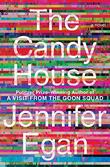As readers, we feel protective of the books that we love. The experience of discovering a great book—one that seems to speak directly to us—can border on the sacred, and any attempt to recapture the original magic is a dangerous activity. I know readers who refuse even to reread a book that they once loved, for fear of discovering they don’t love it quite so much the second time around.
 So imagine the pressure on an author who decides to revisit a beloved character, setting, or storyline in a new literary work. Take, for instance, Jennifer Egan, whose latest novel, The Candy House (Scribner, April 5), is a companion to her critically acclaimed 2010 book, A Visit From the Goon Squad, which won the National Book Critics Circle Award and the Pulitzer Prize. Egan doesn’t consider the new book a sequel. But it does revisit some of the characters, both major (Sasha, Lulu) and minor (Bix Bouton), as well as some thematic concerns (the effects of technology, the passage of time) that featured in Goon Squad.
So imagine the pressure on an author who decides to revisit a beloved character, setting, or storyline in a new literary work. Take, for instance, Jennifer Egan, whose latest novel, The Candy House (Scribner, April 5), is a companion to her critically acclaimed 2010 book, A Visit From the Goon Squad, which won the National Book Critics Circle Award and the Pulitzer Prize. Egan doesn’t consider the new book a sequel. But it does revisit some of the characters, both major (Sasha, Lulu) and minor (Bix Bouton), as well as some thematic concerns (the effects of technology, the passage of time) that featured in Goon Squad.
In an interview I recently conducted with Egan (look for it in the April 15 issue), she explained that she set the bar very high for this novel. “I felt that it should be even a little better [than A Visit From the Goon Squad], ideally, because Goon Squad is lucky enough to have a lot of fans, and there’s nothing worse than a tepid follow-up.”
I’m here to attest that The Candy House is anything but tepid. At the center of the book’s many characters and stories is a new technology, Own Your Unconscious, which allows users to download their memories to an external drive—and, potentially, share them with others in a virtual cloud. The parallels with social media, and its dizzying implications for private life and social mores, are fascinating. Best of all, you don’t need to have read Goon Squad to understand it. And if you have read the earlier book, I recommend leaving it on the shelf and enjoying this one on its own—at least on your first read.
Another literary superstar has a new novel out this month, and if it’s not a companion to his earlier work, it’s certainly a return to the working-class Glasgow setting he evoked so well in his Booker Prize–winning 2020 debut, Shuggie Bain. Like that book, Douglas Stuart’s Young Mungo (Grove, April 5) features a young queer protagonist devoted to his alcoholic mother and trying to survive in a world of brutally toxic masculinity. But while the earlier novel kept a tight focus on mother and son, the new one broadens to include Mungo Hamilton’s siblings; two ex-cons that his mother enlists to mentor the fatherless teenager; and James, another gay boy, with whom he develops a touching connection. Shuggie Bain completely blew me away—it was a debut, after all—but Young Mungo is a more complex novel, balancing tragedy and hope in a stunning feat of storytelling.
I can’t recommend these novels enough—both for those who were already fans of the authors and those coming to them for the first time.
Tom Beer is the editor-in-chief.































